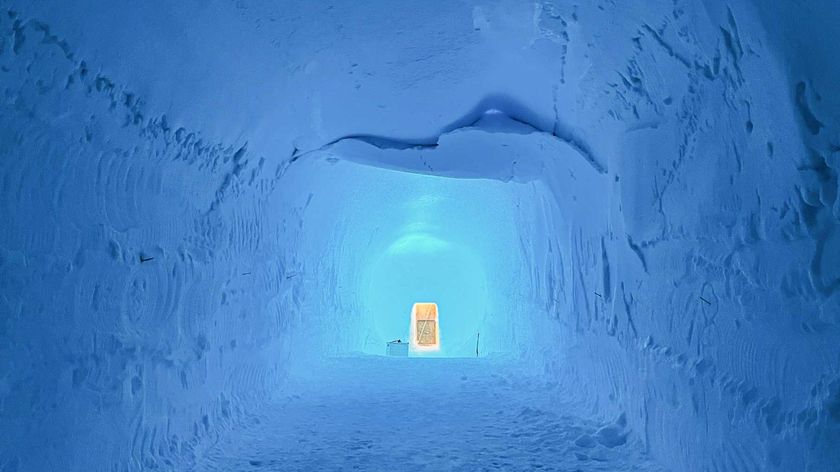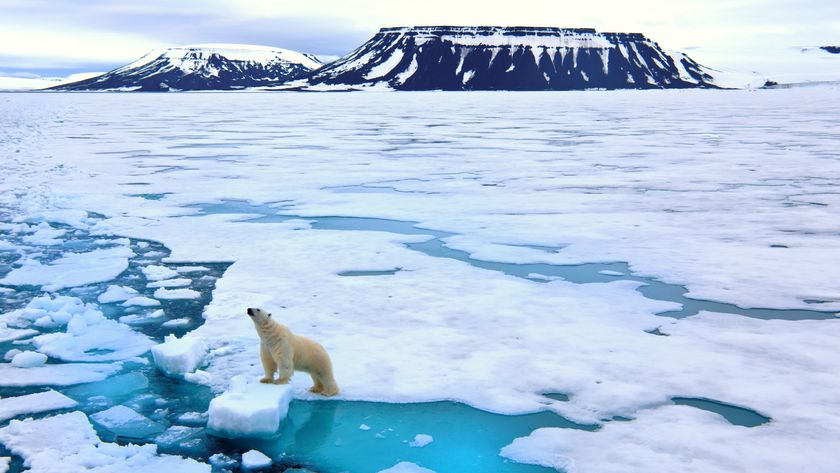
Rescue in the Arctic: Historic Treaty To Coordinate Operations
When an uncharted rock off the remote Arctic coast of Nunavut, Canada, grounded the cruise ship MV Clipper Adventure this past August, the 128 passengers aboard got very lucky. Sunshine and calm seas prevailed, and they waited just three days before a Canadian icebreaker came to the rescue.
The story ended happily, but plenty of "what ifs" lingered. What if the weather had worsened? What if the accident had happened in an even more isolated corner of the Arctic? Who would have saved the stranded vacationers then?
A new treaty, the first between the eight Arctic nations, will coordinate search-and-rescue operations in Earth's vast and inhospitable Far North, where tourism , shipping and other human activities are on the rise.
The treaty was negotiated in December in Reykjavik, Iceland, and is expected to be signed at a meeting scheduled for May 12 in Nuuk, Greenland. It establishes areas where the United States, Canada, Russia, Denmark, Iceland, Sweden, Finland and Norway will each take lead responsibility for search-and-rescue operations, David Balton, deputy assistant secretary for oceans and fisheries at the U.S. Department of State, told OurAmazingPlanet.
The U.S. zone of responsibility will comprise Alaska and its waters north all the way to the North Pole, part of the Bering Sea, and areas around the Aleutian Islands, said Balton, who took part in the negotiations. "We would have the lead responsibility for coordinating a rescue mission, drawing in assistance from other Arctic countries as we need" in the event of an incident in the U.S. area, he said. Likewise, if called upon, the United States would have a commitment to try to help with incidents in other areas.
More people, more peril
As the Arctic warms and sea ice retreats , more people are venturing into the region's once impenetrable waters. Tourism, research, shipping, oil and gas exploration and international overflights are expected to increase.
Sign up for the Live Science daily newsletter now
Get the world’s most fascinating discoveries delivered straight to your inbox.
The United States anticipates more ship traffic in the Bering Strait , between Russia and Alaska, for example, as sea ice melt increasingly opens it up as an attractive shipping route.
All of this increased activity could mean more potential rescue missions.
"There undoubtedly will be more need for search and rescue in the Arctic as people get into trouble up there," Balton said. "That's what prompted the negotiation of this agreement."
Balton said the eight countries involved will need to augment their search-and-rescue gear and manpower to meet the growing need. "None of the eight countries have sufficient infrastructure at this time," he said.
Arctic cooperation
The Arctic, being mostly sea and ice, is owned by no nation. And while the eight nations have jurisdiction to the limits of their continental shelves, a number of important territorial boundaries remain in dispute. (By contrast, Antarctica is governed by a treaty system that tables all territorial claims indefinitely.)
The search-and-rescue treaty has no bearing on those territorial claims, Balton said, but it is the first binding agreement ever negotiated between the eight Arctic nations. It's also the first agreement made under the auspices of the Arctic Council, an intergovernmental forum established in 1996. "It's historic in both those ways," Balton said.
If the new treaty is successful, it could strengthen the Arctic Council and pave the way for negotiations there on more contentious topics that are looming, such as shipping rights, oil and gas reserves, mineral deposits and other resources, said Oran Young, an Arctic expert based at the University of California, Santa Barbara.
'It's timely. It's needed. It's an example of cooperation in an area, quite frankly, where many in the news media are saying there's going to be a rush for resources" and some even go so far as to forecast violent conflict, Young said.
As for what the Arctic Council might take on next, Balton said an agreement covering emergency responses to environmental disasters is possible.
"People are keenly aware that if the Gulf oil spill had occurred instead in the Arctic, it would have been an even worse disaster," he said.












